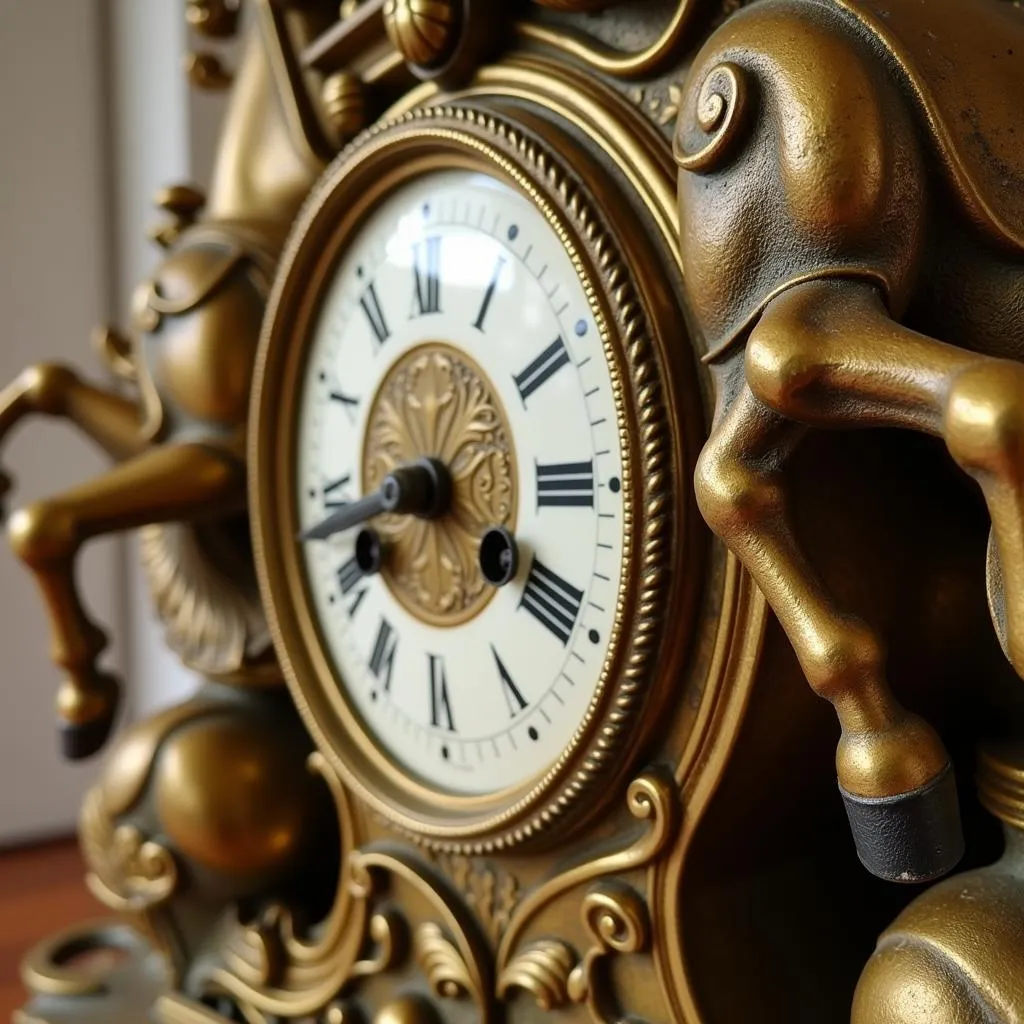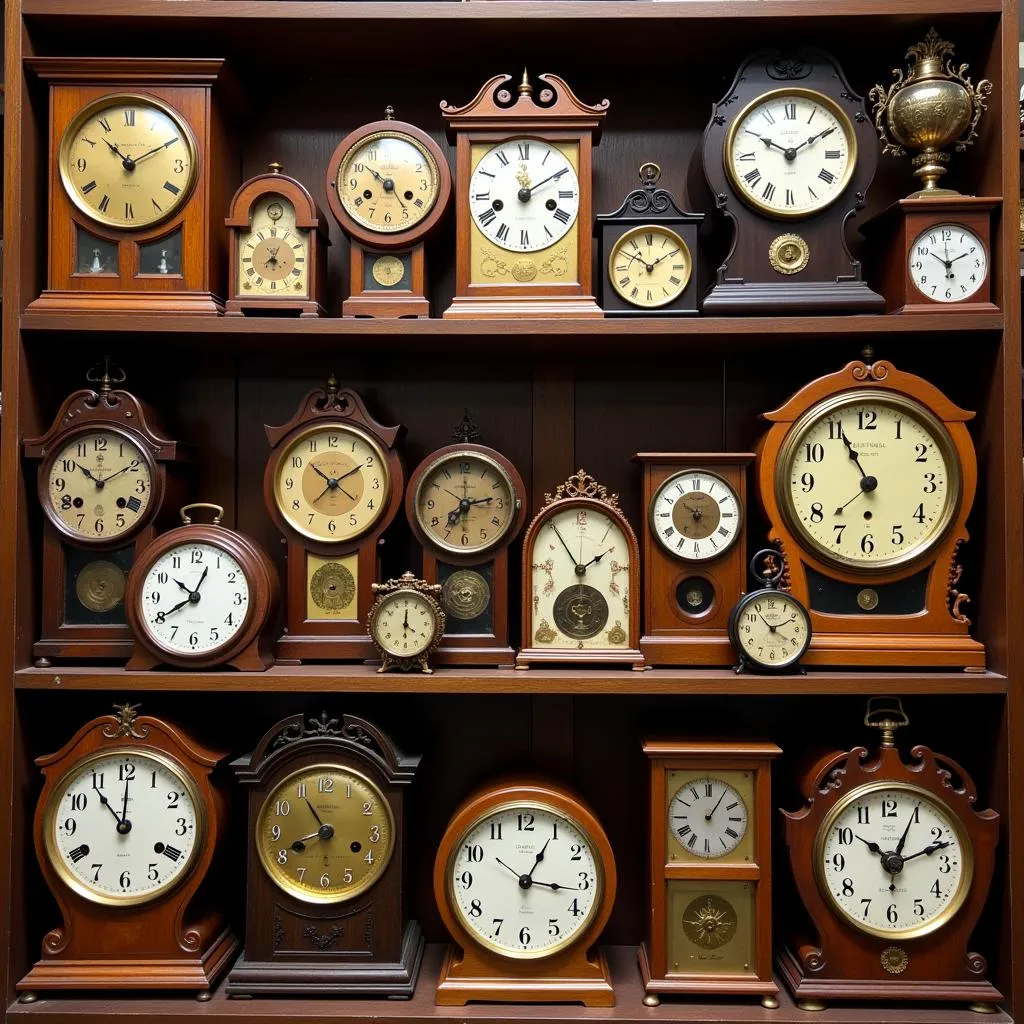Horse clocks, a fascinating intersection of horology and equestrian art, have graced homes and stables for centuries. These antique timepieces, often featuring intricate designs and meticulous craftsmanship, offer a glimpse into the historical significance of horses in society. More than just timekeepers, they serve as a testament to the enduring bond between humans and these majestic creatures.
The Allure of Horse Clocks: Why We’re Still Drawn to Them
Antique horse clocks, particularly those dating back to the 19th and early 20th centuries, hold a particular allure for collectors and enthusiasts alike. Their enduring appeal can be attributed to several factors:
- Exquisite Craftsmanship: Many antique horse clocks were crafted with incredible attention to detail. From hand-painted porcelain faces to meticulously carved wooden cases, these timepieces were often true works of art.
- Historical Significance: Horse clocks emerged during a time when horses were integral to daily life. They served as reliable modes of transportation, work companions, and symbols of status and wealth. Owning a horse clock reflected this deep connection to the equestrian world.
- Nostalgia and Charm: Antique horse clocks evoke a sense of nostalgia for a bygone era. Their ticking hands and charming designs can transport us back to a simpler time when life moved at a slower pace.
- Investment Value: Certain antique horse clocks, especially those in pristine condition or made by renowned makers, can appreciate in value over time, making them a worthwhile investment for collectors.
Types of Antique Horse Clocks
The world of antique horse clocks is surprisingly diverse. Here are some of the most common types you might encounter:
- Mantel Clocks: As the name suggests, these clocks were designed to sit upon a mantelpiece. They often featured elaborate cases adorned with horse motifs, such as galloping steeds, horse heads, or equestrian scenes.
- Wall Clocks: Larger and more imposing, antique horse wall clocks often graced the walls of stables, tack rooms, or grand estates. Their size allowed for intricate dials and decorative elements.
- Carriage Clocks: Compact and portable, carriage clocks were initially designed for travel. Their connection to horses stems from their use in horse-drawn carriages. Some antique carriage clocks feature equestrian-themed engravings or inlays.
- Regulator Clocks: Known for their accuracy, regulator clocks were often found in places where precise timekeeping was essential, such as businesses and train stations. While not exclusively equestrian-themed, some antique regulator clocks incorporated horse motifs into their designs.
 Antique Horse Mantel Clock with Bronze Stallion
Antique Horse Mantel Clock with Bronze Stallion
Identifying and Dating Your Antique Horse Clock
Determining the age and origin of an antique horse clock requires a keen eye for detail. Here are some key factors to consider:
- Materials: Examine the materials used in the clock’s construction. Early horse clocks were often made from wood, porcelain, or brass, while later examples might incorporate materials like cast iron or marble.
- Style and Design: The clock’s style can provide clues to its age. For example, clocks from the Victorian era (1837-1901) often featured ornate details and darker wood tones, while Art Deco clocks (1920s-1930s) embraced geometric shapes and bolder designs.
- Movement: The clock’s movement, referring to its internal mechanism, can also offer insights into its age. Early clocks used weight-driven or spring-driven movements, while later clocks incorporated quartz movements.
- Maker’s Marks: Check the clock for any maker’s marks or signatures. These can be found on the clock face, back, or movement. Researching the maker can help pinpoint the clock’s origin and approximate age.
Caring for Your Antique Horse Clock
Antique horse clocks are not just decorative objects; they are pieces of history that deserve to be treated with care. Here are some essential tips for preserving their beauty and functionality:
- Regular Cleaning: Dust your clock gently with a soft cloth. Avoid using harsh chemicals or abrasive cleaners, as these can damage the clock’s finish.
- Professional Servicing: Have your clock serviced by a qualified clockmaker every few years to ensure its accuracy and longevity. They can clean the movement, lubricate parts, and make any necessary repairs.
- Proper Handling: Handle your clock with care, supporting its base and avoiding any sudden movements.
- Controlled Environment: Display your clock in a stable environment away from direct sunlight, extreme temperatures, and humidity.
Horse Clocks Today: A Legacy Continues
While the era of horse-drawn carriages may be long gone, the allure of antique horse clocks remains as strong as ever. These timeless pieces continue to captivate collectors, history buffs, and anyone with an appreciation for fine craftsmanship and equestrian heritage. Whether you’re drawn to their intricate designs, historical significance, or simply their charming presence, antique horse clocks offer a unique window into the past.
 Antique Horse Clock Collection on Display
Antique Horse Clock Collection on Display
FAQs About Antique Horse Clocks
1. How much is my antique horse clock worth?
The value of antique horse clocks can vary greatly depending on factors like age, condition, maker, and rarity. It’s best to consult with a reputable appraiser or antique specialist for an accurate valuation.
2. Where can I find antique horse clocks for sale?
You can find antique horse clocks at antique shops, auctions, estate sales, and online marketplaces like eBay and Etsy.
3. Can I repair an antique horse clock myself?
It’s not recommended to attempt repairs yourself unless you have experience with clock repair. Antique clocks have delicate mechanisms that can be easily damaged.
4. What are some popular makers of antique horse clocks?
Some renowned makers of antique clocks that featured equestrian themes include Ansonia, Seth Thomas, and New Haven.
5. Are antique horse clocks a good investment?
Like any antique, the investment potential of horse clocks depends on various factors. Clocks in excellent condition, made by sought-after makers, or with unique features are more likely to appreciate in value over time.
Need Help with Your Equestrian Timepiece?
At Justus Horses USA, we share your passion for horses and the exquisite artistry of antique horse clocks. If you have any questions about these timeless timepieces, or if you need assistance finding the perfect one for your collection, don’t hesitate to contact us. Our team of experts is here to help!
Call us: 0772127271
Email us: [email protected]
Visit us: QGM2+WX2, Vị Trung, Vị Thuỷ, Hậu Giang, Vietnam.
We offer 24/7 customer support and are always happy to assist you in any way we can.